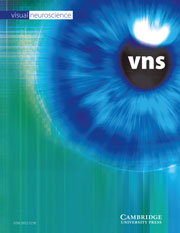Article contents
Protein partners of dynamin-1 in the retina
Published online by Cambridge University Press: 10 June 2013
Abstract
Dynamin proteins are involved in vesicle generation, providing mechanical force to excise newly formed vesicles from membranes of cellular compartments. In the brain, dynamin-1, dynamin-2, and dynamin-3 have been well studied; however, their function in the retina remains elusive. A retina-specific splice variant of dynamin-1 interacts with the photoreceptor-specific protein Tubby-like protein 1 (Tulp1), which when mutated causes an early onset form of autosomal recessive retinitis pigmentosa. Here, we investigated the role of the dynamins in the retina, using immunohistochemistry to localize dynamin-1, dynamin-2, and dynamin-3 and immunoprecipitation followed by mass spectrometry to explore dynamin-1 interacting proteins in mouse retina. Dynamin-2 is primarily confined to the inner segment compartment of photoreceptors, suggesting a role in outer segment protein transport. Dynamin-3 is present in the terminals of photoreceptors and dendrites of second-order neurons but is most pronounced in the inner plexiform layer where second-order neurons relay signals from photoreceptors. Dynamin-1 appears to be the dominant isoform in the retina and is present throughout the retina and in multiple compartments of the photoreceptor cell. This suggests that it may function in multiple cellular pathways. Surprisingly, dynamin-1 expression and localization did not appear to be disrupted in tulp1−/− mice. Immunoprecipitation experiments reveal that dynamin-1 associates primarily with proteins involved in cytoskeletal-based membrane dynamics. This finding is confirmed by western blot analysis. Results further implicate dynamin-1 in vesicular protein transport processes relevant to synaptic and post-Golgi pathways and indicate a possible role in photoreceptor stability.
Information
- Type
- Research Articles
- Information
- Copyright
- Copyright © Cambridge University Press 2013
References
- 7
- Cited by

